Written by Jenn Hand, Holistic Nutritionist, Board Certified Health Coach, NBC-HWC, Binge Eating Coach
Why Do I Binge Eat!?!
I vividly remember the days when I would find myself standing in front of the refrigerator late at night, after everyone had gone to bed, guiltily searching for cookies, ice cream or chips — anything to make me feel “better.”
I didn’t know it then, but I used food to soothe the part of me that didn’t feel like she fit in, to get a reprieve from the ache of loneliness I felt inside, to ease the pressure I put on myself to be “perfect”, and comfort from the other emotions I didn’t know how to deal with.
Plus I always thought I needed to be “skinner,” no matter what I weighed.
No matter how much I ate, I never felt truly satisfied, and the guilt that followed only made things worse. It took me a long time to understand that my binge eating wasn’t about hunger. It was a way to cope with overwhelming emotions, stress, and unmet needs in my life.
Binge eating often arrises for a number of reasons. There are emotional, psychological, and environmental factors that affect binge eating. Many people use food as a way to soothe difficult feelings like sadness, loneliness, or anxiety.
Restrictive diets and deprivation also lead to bingeing, as the body and mind rebel against the strict rules we set and can never maintain.
Additionally, societal pressures, the conditioning of diet culture, and low self-esteem can contribute to the urge to binge eat. Understanding that binge eating is a response to deeper issues is the first step toward healing.
By addressing the root causes and developing healthier coping mechanisms, it’s absolutely possible to break free from the cycle and find peace with food
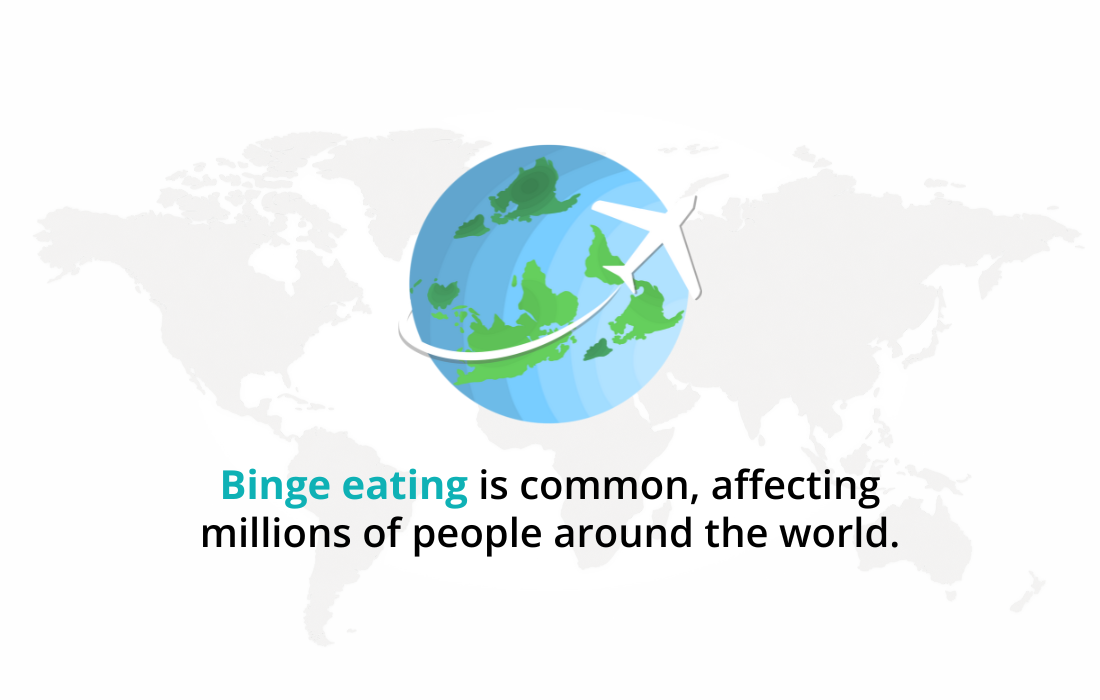
Is Binge Eating a Disorder?
From my perspective, what really matters is whether binge eating is affecting your life.
I’ve never been a fan of rigid labels or categorizing food struggles because, in my experience, most women don’t fit neatly into one box. During my own journey, I swung between severe restriction, extreme diets, and months of bingeing—none of which fit neatly into a specific disorder.
For some, receiving a formal diagnosis might be helpful. But for others, simply getting the support they need to address their issues can be enough, without the need for a label.
Table of Contents
- Is Binge Eating a Disorder?
- Why Is Binge Eating So Common?
- What Are the Most Common Binge Eating Triggers?
- How Do I Know If I Have a Binge Eating Problem?
- Emotional Eating vs. Binge Eating
- Mental Health and Binge Eating
- Strategies to Overcome Binge Eating
- Positive and Healthy Eating Habits to Cultivate
- Mental Habits to Deal with Weight Gain
- Should I Work with a Professional?
- Type of Coaches and Therapists for Binge Eating
- You Can Do This!
- Common Questions about Binge Eating
Why Is Binge Eating So Common?
Binge eating is common, affecting millions of people around the world.
Statistics show that it is the most prevalent eating disorder in the United States, affecting approximately 2.8 million adults at some point in their lives. One reason it’s so widespread is that we live in a society that promotes dieting, thinness, and control over food, which can lead to restrictive eating patterns.
We can get sucked into diet culture very easily — with promises of quick weight loss and being “happy” with your body, our society reinforces some of the habits and behaviors that can lead to bingeing.
When we spend many months (or years!) dieting and depriving ourselves, our bodies often rebel, leading to binge eating as a way to compensate for the restriction.
I’ve also found that many people struggle with learning how to deal with their emotions without food. Many of us grow up turning to food as a coping mechanism for stress, anxiety, or other emotional challenges.
When we don’t learn how to deal with the ups and downs of life, food seems to be there to help us cope. The good news is that with the right support and approach, it’s possible to break free from this cycle.
Differentiate Between Binge Eating and Emotional Eating
Binge eating and emotional eating are often confused, but they are different behaviors.
Binge eating involves consuming large amounts of food in a short time, often with a sense of loss of control and followed by intense guilt or shame. It is typically more extreme and frequent than emotional eating and can feel compulsive.
Emotional eating, on the other hand, is when someone eats in response to their emotions rather than physical hunger. This can happen occasionally, such as eating comfort food when feeling stressed or sad, but it doesn’t necessarily involve the large quantities or loss of control seen in binge eating.
While emotional eating isn’t an eating disorder in itself, it can become problematic if it’s the main way someone deals with their emotions.
In my experience, understanding the difference between the two is key to addressing the underlying issues and developing healthier coping mechanisms. What I’ve found working with women for over a decade is that these very often go hand in hand.
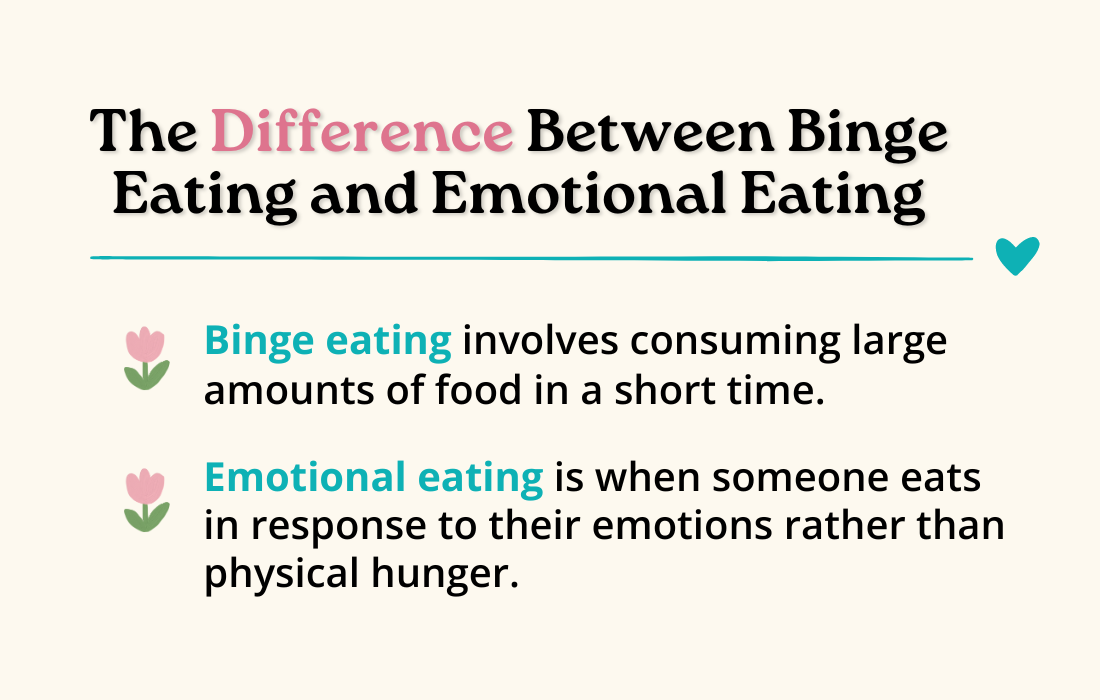
What Are the Most Common Binge Eating Triggers?
Identifying and understanding the triggers for binge eating is crucial for breaking the cycle and developing healthier eating habits.
From my own struggle and working 1:1 as a coach, here are the five triggers I’ve found to be the most common:
1. Hard emotions
Life can throw a lot at us that we don’t know how to handle.
When we’re overwhelmed with our endless to-do list, gutted by the pain of a break up or loss, anxious about the uncertainty of the future or feeling any other challenging emotion, it can lead to using food as a way to cope.
2. Dieting and restriction
It’s the law of dieting (as I like to call it!) For every equal and opposite diet, there is a binge.
Strict diets or prolonged periods of restriction lead to rebellion, intense cravings and usually a binge.
3. Not knowing what to “do” with themselves
I remember my old therapist used to tell me: The root cause of all man’s suffering is his inability to be alone with himself.
We don’t know how to be alone. We don’t know how to fill our time when there’s “nothing” to do. When we lack stimulation or feel unfulfilled, we turn to food to fill the void and distract ourselves.
4. Fatigued from the busy-ness of life
Life in the 21st century can be hard.
We are expected to have, do and be it all. So we’re naturally exhausted, overwhelmed, and feel like our to-do list never gets done. Being overly tired or exhausted can lead to binge eating as a quick pick me up or “energy” boost.
5. Social situations
Socially, it’s easy to get triggered by people or gatherings that revolve around food.
This can trigger binge eating, especially if there’s pressure to eat or if it’s the only time we “allow” ourselves to have a treat.
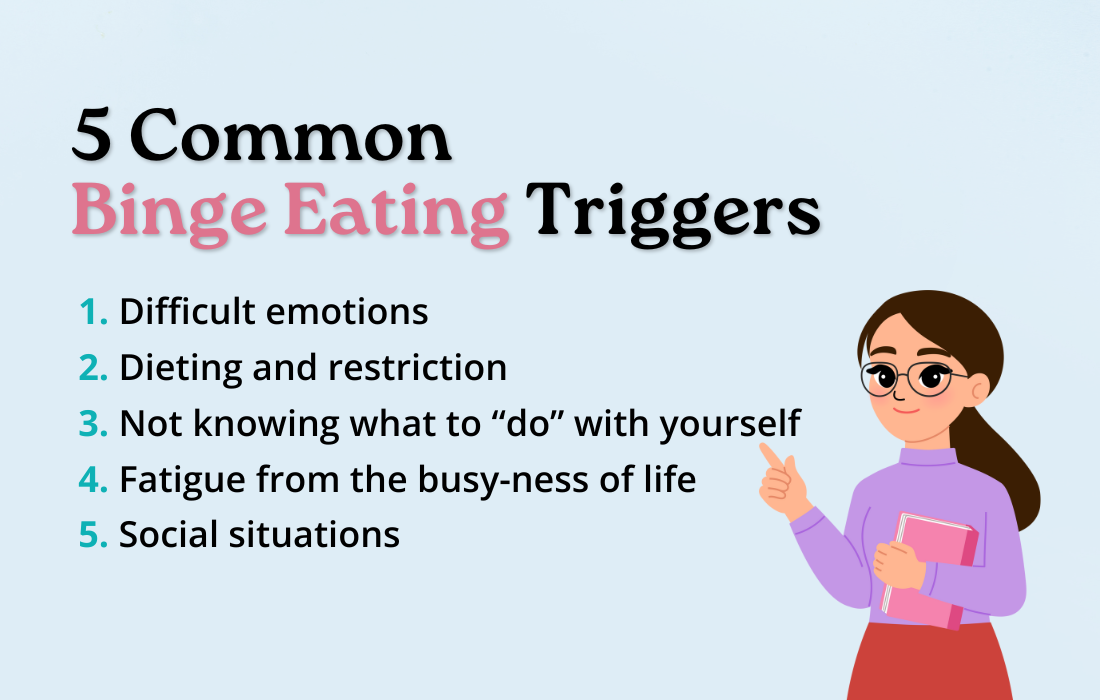
How Do I Know If I Have a Binge Eating Problem?
Recognizing a binge eating problem can be challenging, as it often hides under the guise of normal eating habits gone awry.
For me, I didn’t know it wasn’t “normal” to spend your life dieting and then overeating. I lived so long in the cycle that I never questioned if it was normal.
Many people may not realize they have an issue until the cycle of overeating starts affecting their daily life. One of my clients, Sarah, shared that she used to justify her late-night eating as simply being “rewarding herself for a long day.”
However, it wasn’t until she found herself eating an entire box of cookies in one sitting, night after night, feeling out of control and overwhelmed with guilt afterward, that she realized something deeper was at play. She woke up hating herself, and swearing off cookies forever.
It would impact her mood for the day and how she felt about her body.
For Sarah, the turning point was acknowledging that her eating habits were no longer about hunger, but about an emotional void she was trying to fill. She was stressed, overwhelmed and struggling with her job — and realized she was using food to cope.
If you find yourself eating large amounts of food in a short period, feeling powerless to stop, or experiencing intense guilt afterward, it may be worth exploring support.
Emotional Eating vs. Binge Eating
Emotional eating and binge eating are often confused (and there is a lot of overlap!), but they aren’t necessarily the same.
Emotional eating is when you turn to food for comfort, stress relief, or as a reward, but it doesn’t always lead to loss of control. For example, you might reach for ice cream after a tough day, but stop after a few bites.
Binge eating, however, involves consuming large quantities of food with a sense of urgency and often leads to feeling physically uncomfortable or sick. The key difference lies in the loss of control. While emotional eating can be a component of binge eating, not all emotional eaters are binge eaters.
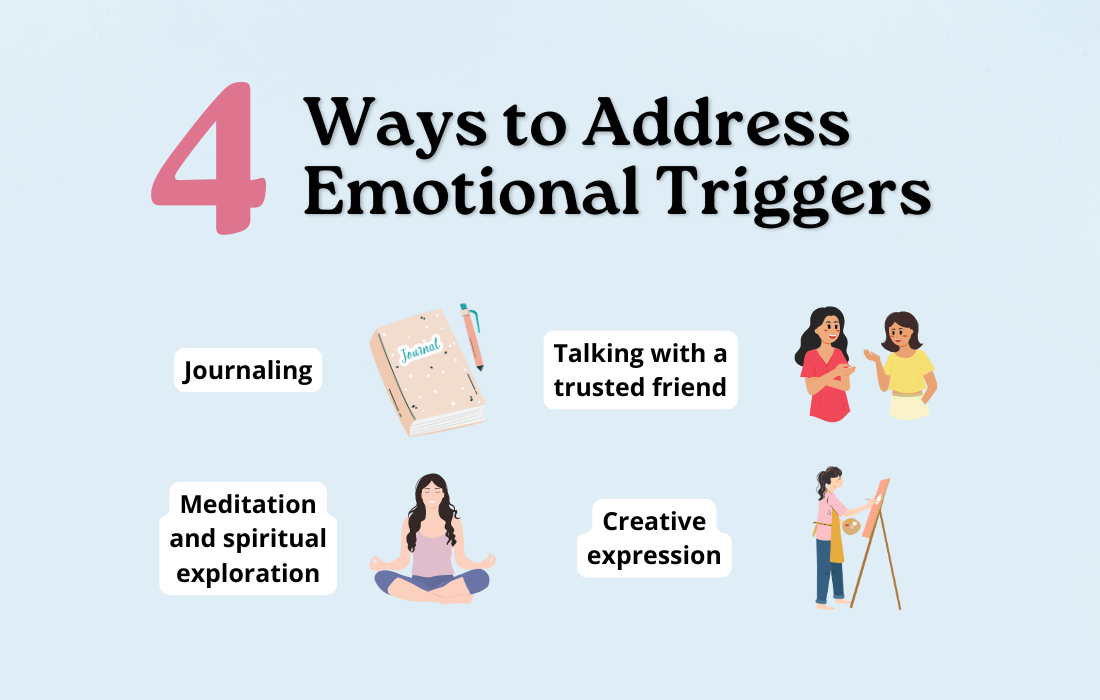
Mental Health and Binge Eating
Binge eating is deeply intertwined with mental health.
It’s often not just about the food, but about using food to cope with unresolved emotions, stress, or anxiety. Many people who struggle with binge eating also experience depression, anxiety, or low self-esteem, which can create a vicious cycle.
Someone might binge eat to numb feelings of sadness, but then feel guilt and shame afterward, leading to more binge eating (and feeling worse about their bodies, triggering even lower self-esteem.)
This connection highlights the importance of addressing the underlying emotional and psychological factors, not just the eating behavior itself.
Coaching, mindfulness, and self-compassion can be critical components in breaking this cycle.
Strategies to Overcome Binge Eating
Overcoming binge eating is a complex issue and I always take a four pronged approach: physical, mental, emotional and spiritual.
Physically, it’s helpful to aim for balance rather than perfection and focus on eating every 3-4 hours, adding protein to each snack or meal. This helps even out your blood sugar which prevents extreme hunger and keeps you more “even-keeled” to make more conscious food decisions.
Mentally, our minds matter on this path! What we say to ourselves, those tapes that loop on repeat can serve us (or not!) Pay attention to what you say to yourself around food. What rules are you following? What are you judging yourself for? (“good” and “bad” foods) Where can you soften a way of thinking that falls into the all-or-nothing mindset?
Exploring your thoughts is a great way to start to shift out of the ones that no longer serve you!
Emotionally, work to identify and address emotional triggers. Journaling, therapy, or talking with a trusted friend can help you uncover the emotions that lead to binge eating.
Explore what helps you take care of your emotional needs without food — it is an exploration that begins with asking what need you’re using food to fulfill (and then seeing what bubbles up.)
Spiritually, food may “fill” an emptiness or angst we have inside. Meditation, spiritual exploration, creative expression, pleasure, and other ways to fulfill our soul’s calling or purpose can help with those who use food in this way.
For me, part of my food battle was learning how to be with “myself” to see what was inside.
Remember, healing is a gradual process, and it’s important to be patient and compassionate with yourself as you work to break free of the binge cycle.
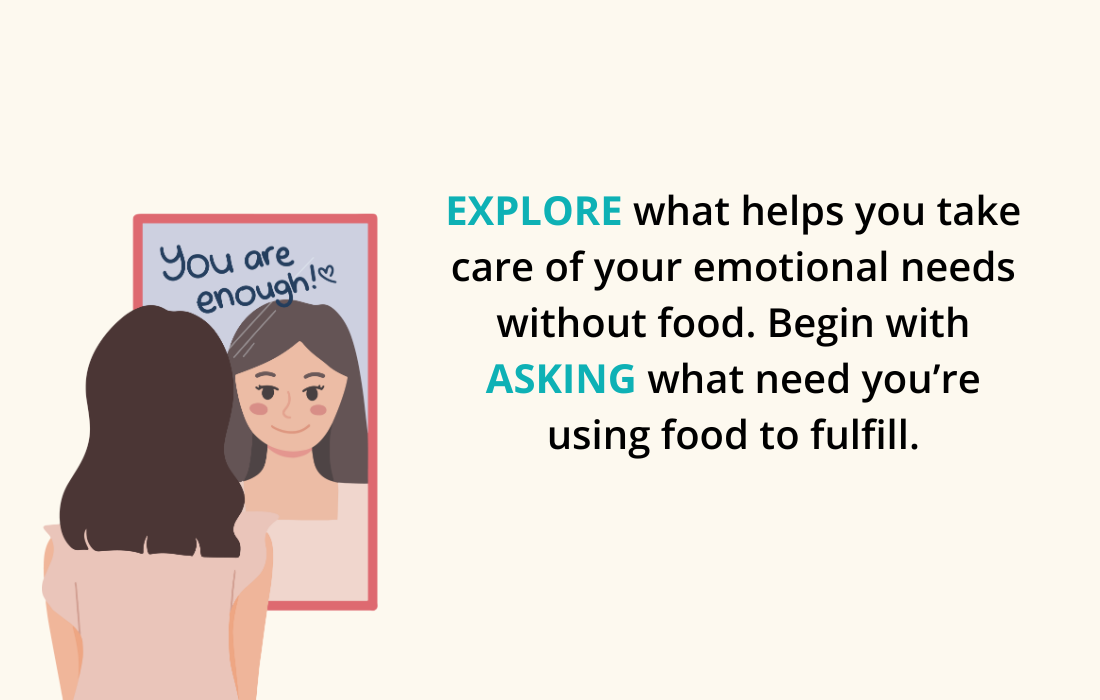
Positive and Healthy Eating Habits to Cultivate
Cultivating positive and healthy eating habits can make a big difference in your relationship with food.
But where to start? The place I always recommend beginning is focusing on eating every 3-4 hours, adding protein to every meal or snack. This begins to balanced your blood sugar, create a routine and reduce the likelihood of bingeing due to extreme hunger.
Another habit is to practice mindfully eating without distractions, such as TV or phones, which can help you stay attuned to your hunger and fullness cues. I always like to add in journaling to mindfully eating — what comes up when you slow down. Is there anxiety? What thoughts are swirling? What rules surface?
Any shift in patterns always begins with awareness of what’s going on inside!
Additionally, practicing self-compassion and reframing your mindset around food can help. Instead of labeling foods as “good” or “bad,” focus on how foods impact your body and use words like “nourishing,” “satisfying,” “energizing,” or “balancing” instead.
Mental Habits to Deal with Weight Gain
Dealing with weight gain can be a challenging and emotional experience, especially if you’re prone to the binge-restrict cycle.
This was something I deeply struggle with on this path — when I gained weight, I’d immediately want to diet and restrict to try to ‘get back to’ where I was before. When we’re laser focused on losing weight, it’s easy to fall into the trap of extreme dieting or harsh self-criticism, which can trigger more binge eating.
To avoid this, it’s important to remember that we are working to get OUT of the cycle completely. So every time we diet, then binge, then diet again, we are trapped in the cycle and keep swinging to the opposite side. But if we can resist the urge to diet post binge (and instead work to take care or ourselves and find some balance), we begin to break the wild swings of the cycle.
See if you can practice self-compassion and remind yourself that your worth is not defined by your weight.
Focus on “pretty good is perfect” (my favorite mantra!), and celebrate small victories rather than fixating on setbacks. Another key mental habit is to shift your focus from quick fixes to sustainable, long-term health goals.
Instead of depriving yourself, aim to nourish your body with balanced meals and regular physical activity that you enjoy. What helps you feel taken care of post binge? What do you need to feel nourished? What helps you feel more balanced? Focus on choosing for health and nourishment, rather than weight loss.
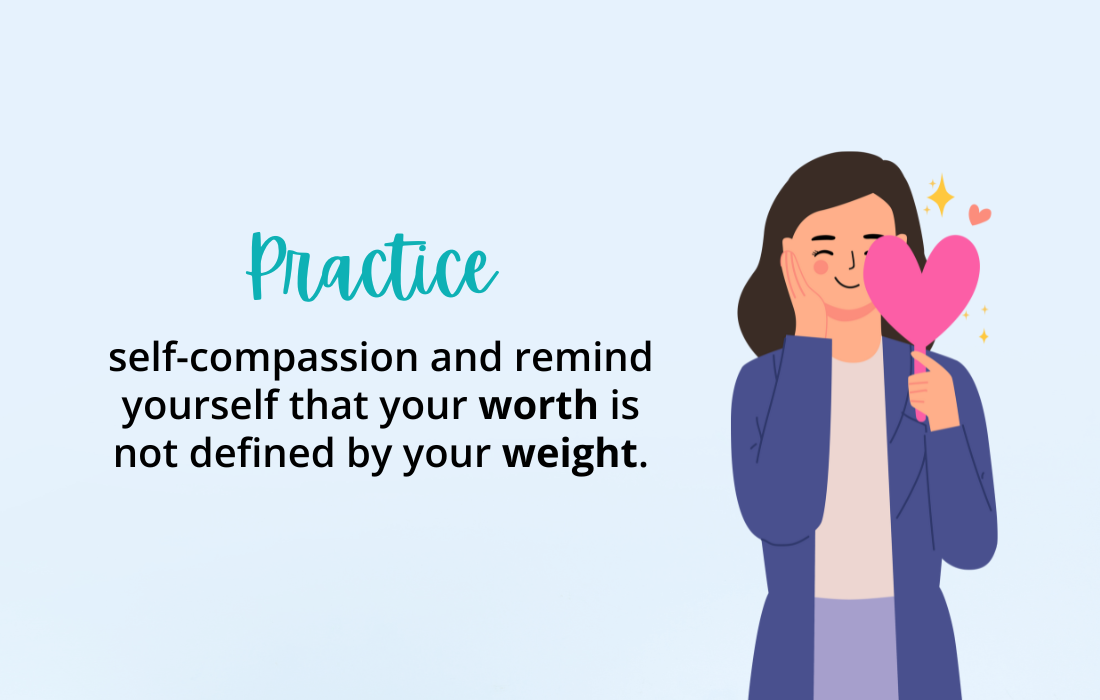
Should I Work with a Professional?
Working 1:1 with a professional can be a game-changer in overcoming binge eating.
Many people try to tackle this issue on their own, but having a trained expert by your side can provide the guidance, support, and clarity you need.
Coaches or therapists can help you identify and address the root causes of your binge eating, whether they’re emotional, psychological, or behavioral. They can also offer tailored strategies and tools that are specific to your needs, helping you to create a personalized plan for recovery.
Having a non-judgmental space where you can explore your relationship with food without fear of criticism is a big aspect of healing.
If you’ve been struggling to make progress on your own, working with a professional might be the next step toward lasting change.
Type of Coaches and Therapists for Binge Eating
There are several professionals who can help you overcome binge eating.
An intuitive eating coach, food relationship coach, or binge eating coach guides you in reconnecting with your body’s hunger and fullness signals.
Therapists can assist in identifying and changing thought patterns that contribute to binge eating.
For more intensive support, eating disorder specialists provide a comprehensive approach, addressing both the psychological and physical aspects of the issue. I always recommend finding someone you connect with and who deeply understands where you’ve been and what you struggle with.
You Can Do This!
Remember that healing is a journey — every step you take towards healing is progress, no matter how small it may seem.
You are not alone in this journey, and there is help available to guide you through the tough times. When I was in the throes of my own battle with dieting and bingeing, I almost gave up many times. I had some serious dark nights of the soul where I would sob myself to sleep.
But there was a spark of hope deep inside me that I clung to — I believed that there had to be more than life than just obsessing over food/body/weight.
Connect to that spark within. There IS more to life than this battle and I know you can get there, one day at a time.
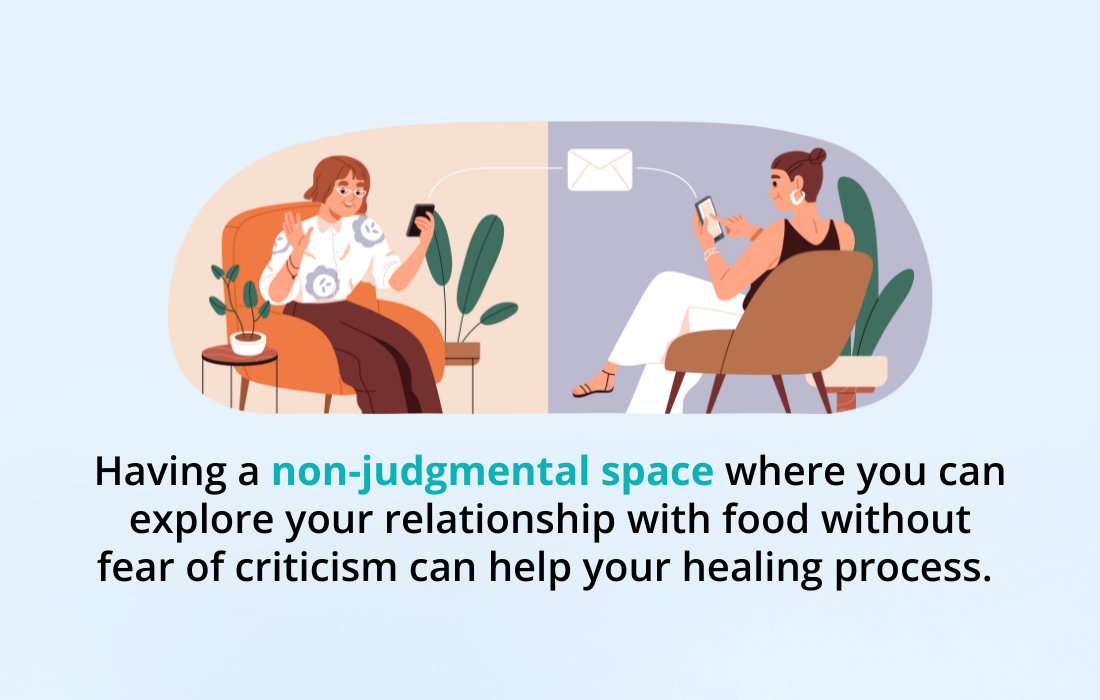
Common Questions about Binge Eating
What is “binge eating disorder”?
Binge eating disorder (BED) is a condition characterized by recurrent episodes of eating large quantities of food, often quickly and to the point of discomfort, accompanied by feelings of loss of control and distress.
It is distinct from overeating, as it involves significant emotional and psychological distress. Not all of the women I work with have BED — you can struggle with binge eating and not necessarily be diagnosed with a disorder.
Is binge eating a “common eating disorder”?
If you’re categorizing disorders, binge eating disorder is one of the most common.
From my experience, food struggles are messy and aren’t often able to be labeled to fit into one box. Many of the women I work with restrict, binge, diet and everything in between. I was never diagnosed with a “disorder” but deeply battled the binge and restrict cycle for 13 years of my life.
Which “eating disorders” are the most common?
The most common eating disorders include binge eating disorder, anorexia nervosa, and bulimia nervosa.
What is the most common eating disorder?
Binge eating disorder is the most common eating disorder in the United States. It often goes undiagnosed due to the shame and stigma surrounding it.
Is compulsive eating different from binge eating disorder?
Compulsive eating involves frequently eating large amounts of food but may not meet the full criteria for binge eating disorder, which includes emotional distress and a sense of loss of control.
Binge eating disorder is a clinical diagnosis, whereas compulsive eating may be a behavior pattern. To me, it’s not about the label but about how much someone struggles with food and how much it impacts their life. I never was diagnosed with a disorder but it impacted my every waking moment.
Why do I binge eat?
Binge eating is a complex issue!
It can stem from emotional triggers, restrictive dieting, and a combination of psychological, biological, and environmental factors. Understanding these triggers is key to healing.
Is emotional eating an eating disorder?
Emotional eating isn’t an eating disorder per se but can contribute to or be a symptom of an underlying disorder, like binge eating.
Those who emotionally eat use food to cope with negative emotions and challenging emotions.
What types of eating behavior could be red flags that something is wrong?
Frequent bingeing, extreme restriction, obsession with food, or feeling out of control around food can all be red flags.
These behaviors may signal an underlying eating disorder or something you may need support with.
Is skipping meals a common trigger for binge eating?
Skipping meals can increase the likelihood of binge eating later as the body and mind respond to extreme hunger.
Regular, balanced meals can help prevent the urge to binge.
What are the most common symptoms of binge eating?
Common symptoms include eating large amounts of food rapidly, feeling out of control while eating, and experiencing guilt or shame afterward.
These symptoms often occur at least once a week over a period of several months.
How do I know if I’m a healthy weight?
A healthy weight varies for each individual and takes into account factors like body composition, lifestyle, and overall health.
It’s important to focus on overall well-being rather than just the number on the scale.
How can I stop eating when I’m stressed or emotionally triggered?
Developing alternative coping strategies, practicing mindfulness, and seeking support can help manage stress without turning to food.
It’s also helpful to identify and address the root causes of emotional triggers. (My favorite way to support myself? Journaling!)
I’m trying to figure out how to treat binge eating disorder. Do I have to see a psychologist or can I seek other types of help?
While a psychologist can provide valuable treatment, other forms of support like nutrition counseling, coaching, and support groups can also be beneficial.
When you’re seeking help, it can be valuable to work with someone who deeply understands binge eating.
What is the National Eating Disorders Association?
The National Eating Disorders Association (NEDA) is a nonprofit organization dedicated to supporting individuals affected by eating disorders through resources, education, and advocacy.
Related Articles
⚪ What Role Does Nutrition Play in Recovering From Binge Eating?
⚪ Why Do I Binge On Sugar?
⚪ What To Do After Binge Eating Sugar
⚪ What Are the Most Common Misconceptions about Binge Eating?
Get the Normal Eater’s Newsletter
Join 8000+ women who are overcoming overeating, binge eating, and breaking up with dieting forever. Get Jenn’s inspiring and actionable weekly newsletter with the latest posts, podcasts, and tips on how to love your body, find food freedom, and lose weight holistically.
Get the Normal Eater’s NewsletterWork with an Emotional Eating & Holistic Nutrition Coach
Overcome Bingeing and Emotional Eating, and Break Up with Yo-yo Dieting
Working with an emotional eating coach and holistic nutritionist can help you get free from the frustrating binge and restrict cycle and stop yo-yo dieting.
You don’t have to be obsessed with food or have a million rules around eating to find your natural weight and learn to love your body. Ready to actually see a lasting change and experience true freedom?
Schedule a 20-min CallAbout the Author:

Jenn Hand has been helping women like you become normal eaters since 2015.
She’s worked with thousands of women, helping them to balance their bodies, end bingeing, stop obsessing over food, and start feeling amazing again. As a board-certified health coach and holistic nutritionist, Jenn knows how to support you in making real positive changes that last.
Her articles have been published on Mind Body Green, Tiny Buddha, Thrive Global and other local and global media platforms. She’s the author of How to Be a Normal Eater and the creator of The Normal Eater’s Club program. Listen to Jenn’s advice and tips on the Cake Doesn’t Count Podcast, or read more of her articles for free on the Food Freedom Blog.
Learn About Coaching!





What a great article. You explained all of the aspects of binge eating so well. Learning how to cope with big emotions is something I need to work on.
Glad it was helpful! 🙂